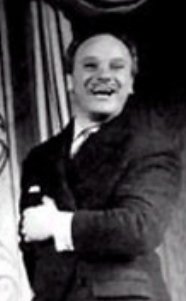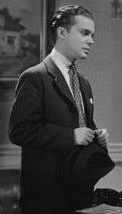
Libertad Lamarque Bouza was an Argentine actress and singer, one of the icons of the Golden Age of Argentine and Mexican cinema. She achieved fame throughout Latin America, and became known as "La Novia de América". By the time she died in 2000, she had appeared in 65 films and six telenovelas, had recorded over 800 songs and had made innumerable theatrical appearances.

Bertha Moss, born Juana Bertha Moscovish Holm, was an Argentine actress of stage, television and film, famous for appearing in many Mexican telenovelas.

Tito Alonso (1926–1979) was an Argentine film actor.

Mecha Ortiz was a classic Argentine actress who appeared in films between 1937 and 1981, during the Golden Age of Argentine Cinema. At the 1944 Argentine Film Critics Association Awards, Ortiz won the Silver Condor Award for Best Actress for her performance in Safo, historia de una pasión (1943), and won it again in 1946 for her performance in El canto del cisne (1945). She was known as the Argentine Greta Garbo and for playing mysterious characters, who suffered by past misfortunes in love, mental disorders, or forbidden love. Safo, historia de una pasión was the first erotic Argentine film, though there was no nudity. She also played in the first film in which a woman struck a man and the first film with a lesbian romance. In 1981, she was awarded the Grand Prize for actresses from the National Endowment for the Arts.
Ana Arneodo was an Argentine actress of the 1940s and 1950s.
Leopoldo Torres Ríos was an Argentine film director and screenwriter. His brother Carlos Torres Ríos was a notable cinematographer. His son was the film director and screenwriter Leopoldo Torre Nilsson.

Manuel Romeo was an Argentine film director, screenwriter, dramatist and score composer, and one of the influential directors in the cinema of Argentina of the classic era. He directed and wrote over 50 films between 1931 and 1951 even composing the musical scores for several.
Manuel Alcón was an Argentine film actor and musician.

Américo Hoss was a prolific Hungarian-Argentine cinematographer.

Orestes Caviglia was an Argentine film actor and film director of the classic era of the Cinema of Argentina.

Lucas Demare was an Argentine film director, screenwriter, and film producer prominent in the Cinema of Argentina in the 1940s, 1950s and 1960s.

Guillermo Battaglia was a prolific Argentine film actor of the classic era of Argentine cinema.

Héctor Calcaño was an Argentine film actor. He appeared in nearly 70 films between 1933 and 1968. He died on 7 September 1969.

Zulema Esther González Borbón, better known as Zully Moreno, was an Argentine film actress of the Golden Age of Argentine Cinema (1940–1960). She appeared in more than 70 movies, earning best actress awards from the Argentine Academy of Motion Picture Arts and Sciences and the Spanish Cinema Writers Circle.

Ángel Magaña was an Argentine film actor who appeared in some of Argentina's notable films of the 1930s, 1940s and 1950s.

Marcos Zucker was an Argentine actor and comedian, known for his work on stage, on television, and in films, he is best known for his comedic roles and appeared in 66 films.
Benita Puértolas was an Argentine film and theatre actress. She was the mother of the film actor Héctor Coire.

Domingo Márquez was an Argentine actor. He starred in films like The Best Father in the World (1941), Los martes, orquídeas (1941), Filomena Marturano (1950), and The Fire Girl (1952). He had a minor role in the acclaimed Silver Condor-winning 1943 film Juvenilia.

George Andreani, pseudonym Josef Dvořáček (born as Josef Kumok; 28 February 1901 in Warsaw, Poland – 2 April 1979 in Buenos Aires, Argentina) was a Polish composer, film score composer, pianist, conductor, and actor. He was noted for his scores of some 75 Argentine films during the Golden Age of Argentine cinema from 1937 to 1959. Aside from his prolific work as a score composer, he was also conductor of the Orquesta Sinfónica Schenley in the 1940s.
Miguel Inclán (1897–1956) was a Mexican film actor. He became known for his villainous roles during the Golden Age of Mexican cinema. His sister was the actress Lupe Inclán.
This page is based on this
Wikipedia article Text is available under the
CC BY-SA 4.0 license; additional terms may apply.
Images, videos and audio are available under their respective licenses.














